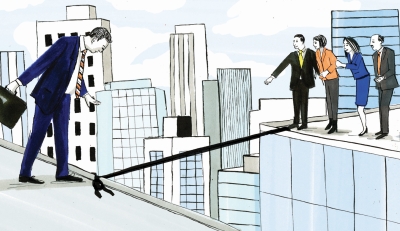We are told early in our careers that to be successful we need to put our heads down and do great work. We are promised that if we build strong relationships and “do the right things,” success will follow. But what if that isn’t true? Welcome to the chilling narrative around practising Big Law today.
Those of us who grew up in law prior to the financial crisis remember pulling all-nighters for weeks on end during our early years; surviving on junk food and forgetting the cadence of the outside world. We didn’t realize that those were, as the millennials would tweet, #champagneproblems.
There’s no doubt that the financial crisis, along with key technological innovations, have shifted the way legal services are delivered. We can collectively admit that the use of disaggregated services, technology, project management and pricing gymnastics are here to stay. New Law has moved beyond an experiment and has demonstrated the ability to drive significant and consistent growth. What no one has been able to decipher, though, is what Big Law will look like in the future.
We hear a lot ominous proclamations about Big Law ailing or even dying. We are told that innovation is particularly difficult for lawyers because partnerships penalize individual innovative behaviour even if it would more broadly benefit the organization. Furthermore, if we accept the world view of disruption guru Clayton Christensen, we come to understand that the demise of one industry may simply be the result of continuing to do the right things.
I, for one, refuse to believe this — not out of wilful blindness, but because, as any entrepreneur knows, businesses can and must pivot to survive. Disruption of the existing model may be the reality, but there will be winners among the old guard as well as losers. Struggles can represent opportunity. For every Kodak, there is a delicious Apple.
What that will look like, I’m not sure anyone can say. We are getting closer, though. We are now in a world where progressive Big Law firms are aligning with incubators, investing in innovation and trying to get on the right side of change. We are hearing thought leaders like Jordan Furlong and Mitch Kowalski explain that, in the future, will be judged not on quality, but metrics. Even the Canadian Bar Association is telling us to Do Law Differently through the Futures Initiative, which argues that lawyers of the future will have to be more sensitive and creative.
Ultimately, as lawyers, we are tasked with providing solutions to our clients’ problems. The best disrupters will be those with a deep understanding of the full tool set at their disposal, and the ability to harness them all in crafting the most efficient solution. There’s no need to sell a Lamborghini when the client just needs a car.
 For my money, I think we will start to see lawyers aligning more closely with non-legal practitioners. We may even see entities offering a variety of brands aimed at different markets under one roof. If done effectively, this could be hugely disruptive.
For my money, I think we will start to see lawyers aligning more closely with non-legal practitioners. We may even see entities offering a variety of brands aimed at different markets under one roof. If done effectively, this could be hugely disruptive.
Just so we are clear, though, it’s not easy to be a true innovator — it takes guts, resilience and a willingness to fail. But imagine what could happen if lawyers became risk-savvy instead of wearing their risk aversion as a badge of honour.
The point is hope. The point is that we can do what we want and certainly more than we do. What if instead of fighting change we embrace it, pivot, and start entering and conquering in new arenas? Battling to preserve the status quo may feel less risky, but those that fail to recognize the need to evolve risk losing both talent and clients to the entities that are looking forward.
Lawyers are brilliant. Borrowing terminology from Roger Martin, “Let’s stop playing not to lose, and start playing to win.”
Shelby Austin is a partner with Deloitte Forensic leading the Legal Project Solutions service offering. LPS works with clients to lower their legal bills, primarily by staffing and managing large document-review projects and due diligence tasks.





